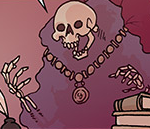|
Souldark posted:I agree with Yawgmoth. Nah, that's not grognard, at least as far as I see. This situation literally sounds perfect as far as RPGs go: the players are invested in the shared reality, they are experiencing real emotions as a result of their own actions, you have not had to do anything mechanical to make the game unfun. I understand the fact that it killed the last bit of your game, but sometimes games end like that. Give them some time to recover, and see what they think about the campaign. Might be a good time to see how they intend to handle it, and help advance the game appropriately.
|
|
|
|

|
| # ? May 8, 2024 23:41 |
|
I don't think you're being harsh at all. This probably isn't fair of me at all, but I really get the feeling that a lot of D&D players just pick "fluff" things like a deity and other basic concept things out of a hat and then disregard them as soon as the game starts and they can kill poo poo and break things. It's okay to incorporate an emotional moment and add some drama to a scene where they have done something very, very bad. It'll get them to think about their actions a little bit instead of just going "oh there's bad guys here let's nuke the town that'll get 'im."
|
|
|
|
Fenarisk posted:
Option A all the way. For starters, the god of love and compassion would give a truly penitent follower a chance at redeeming themselves. For second, it'd give the PCs a stated investment in the town. There's a good chance that this will become their town. They'll start to feel protective of it. I'd say that killing the Aboleth and shattering its MacGuffin should fix a lot of the lost life, while the players putting the vast majority of their treasure from this into rebuilding should fix the rest. Although you should definitely have that bard have a dream where she's talked to by her god about what it means to be a hero and how they ought to try to be a cut above everyone. You could even make it like a parent talking to a teenager. A little upset, sure, but mainly disappointed.
|
|
|
|
Chernori posted:So I guess I'm asking for a sum-up of how to organize and run a successful campaign. I'm big on giving my players as much choice as possible, and beyond that giving them as much "illusion of choice" as they can choke on. I try to never have a situation where if X happens the players have to be at Y. so I basically fill up a note book with hooks and ideas only, nothing concrete. a paragraph or two that looks more like a story outline than anything else. and then based on what my players do, I flip through and grab a story, or I plant a few hooks and go with the ones they follow. here's an example from one of my first campaigns last year: it was world of darkness and the players started out as mortals. one of the PCs was a security guard at a civic construction project building underground tunnels for a subway extension. code:this particular hook became the backbone for that campaign, and a couple other hooks I had became minor story elements. I have a spiral notebook full of these and am working on a new one. P.S. Fensarisk: Option A all the way dude.
|
|
|
|
Fenarisk posted:I'm looking for a way to fix this in-game. My ideas so far are Option A) the god that the bard/sorc worships, which is a god of love and compassion, is going to be pissed. Atonement. Hate the crap out of the spell, but it can become a great RP'ing trope. Talk to the player of the bard/sorc and see if she's down with getting a vision quest plot-hook to go do something that furthers her gods goals without any form of compensation for the party. Might give the rogue a shot at redemption as well, if/when he goes along with it for no gain. At the end, reward with them with a sense of ease, but make sure they get nothing directly from said adventure. Use their guilt to drive them, don't just whitewash the events away.
|
|
|
|
ItalicSquirrels posted:I'm looking to start up a D&D Eberron game and (assuming the players like the idea) I'd like to start them off with some kind of mobile base, like a walking tower or something like that. I'd start it off pretty small, pretty bare bones, and let them add on or modify it however they wished as long as they paid for it (or got others to pay for it as a quest reward). Here're my questions: This provides all sorts of awesome adventure hooks, such as: 1. Dude, where's my castle? - After dumping all their loot off and heading on some wacky adventure, the players return to find that their castle isn't where they left it (this could be early on, before they even realize that it migrates). 2. Who built this thing? - Maybe it always goes to such interesting places because it was built by an adventuring wizard who enchanted it for that very purpose. Maybe it was a built as a mobile siege tower by a dead, warlike nation which enchanted it to seek out areas of strife. Maybe its creator is still alive and that's what it's looking for. 3. It provides a convenient railroad to lead them from place to place. 4. Try to find the device that supposedly controls it. Maybe the guy who gave them the tower actually owns the control device and uses to it have the tower return to him once he has some new suckers lined up. The guy might not even know that the shiny bauble he possesses is actually the control device and pawns it and the tower is really just moving from place to place following the device as it changes hands through trade. I actually like this idea so much, I'm totally stealing it for my next campaign.
|
|
|
|
ripped0ff posted:Maybe instead of starting with a mobile base, they win the deed to Tower Blahdeeblah or Blahdeeblah Castle as part of some early quest. After receiving the deed from the shady dude who hired them, they discover what the catch was, Tower X moves with a mind of its own. It moves slowly around the world with a mind of its own, seemingly infected with wanderlust. Holy tits, if my Eberron campaign gets off the ground I am doing this.
|
|
|
|
Fenarisk posted:Well once that sunk in it killed the last 30 minutes of the night. The bard/sorc was visibly upset from what she had done, to the point of tearing up and not really caring the rest of the night, and the rogue looked to feel bad about it as well and even said "Man I kind of regret that, I don't think we should have done it that way...". This was a huge issue since the rest of the night was great gaming. It's okay for your PCs to gently caress up from time to time, and if they do it's not your job to fix their problems. I actually don't think the call you made was a bad one; the only thing I'd have done differently was to stop the game for a tea/smoke/beer break when a player teared up to check that they were okay to continue, and if not to call the session there and watch a film or something instead. As for what to do next, my advice would be to go with option c): check OC with your players about the kind of game they want to play. Given how willing they were to go straight for combat, it sounded like they were after high-octane action where they fight a lot of bad guys, while you want this to be a game with shades of grey where they have to face the consequences of their actions: they're trying to play Star Wars, you're trying to run Star Trek. If that's the case, then either you can agree that in the future you're going to more clearly signpost which NPCs they ought to be killing so that they can do things their way (they might have seen the glassy-eyed thing as a hint that hey, these guys are zombies, it's okay to cut loose) or they can agree that they're now aware that they're going to have to make sure the NPCs they're killing are actually bad before they kill them. Once that's decided, I'd chalk the encounter up to experience, possibly apologise OC if you've upset them, and move on. I really don't think you should let the PCs retcon their actions: it'll just take any tension away from the next hard decision they have to make if they know you'll not let them gently caress up.
|
|
|
|
Also, I like ItalicSquirrels' idea, except for the bit where most of the villagers get saved. I don't think it's a good idea to go with widespread resurrects of NPCs under any circumstance, even if it is a god doing it, and in this case I can't think of any way it'll not look like the GM tacking on a happy ending. For the bard/sorc's dream, the slant I'd go for is something like: the bard's god posted:"I hope you've learned from your actions why love and compassion are so important. I'm not angry at you. I'm just disappointed, because you're an incredibly talented individual and so are the people around you, but they need to be led by someone who understands love and compassion so that you don't ever misuse those talents again. I hope you see now how true this is; without love and compassion your team would be free to do this again and again until your hearts turn black. You have to stop this happening. I know you might think you've failed me, but you haven't: not totally, not if you learn from your mistake, not while you still have the opportunity to make things better. You then get to have the PCs turn up as mystery saviours, pull children from burning buildings, fix barricades, and kick some bandit rear end (or even find out some clever way of talking the bandits round to protecting the village). All the while the villagers who survived are now awkwardly grateful to the people who are at some point going to have to admit that they were the ones who torched the place to start with.
|
|
|
|
Absolutely do not resurrect all the villagers. Those people died, your PCs killed them. Give your players the option of helping rebuild the town and repair some of the poo poo they did. Rumors about them should spread, and future towns should be less likely to trust them or even let them stay in the local inns. People from this village should be pissed, but also a little grateful since the players have freed them from the aboleth's thrall. How pissed or grateful they are depends on how they felt about the dead people, and how messed up they were by the mind control. If your players want to atone by helping the villagers, do that. If they want to leave, their legend will be tainted by their atrocity and they will be known as people who put glory before the lives of good people. If they win enough glory it will be forgotten, though.
|
|
|
|
Thanks for all the opinions/suggestions. I'm going to see if the players had anything in mind, and mix that with some of my own ideas and ideas from this thread and see where it goes next time we game in like 3 weeks or so. The players have a town of their own they saved earlier in the campaign and are really attached to which I am planning on coming under a small attack/destruction anyway, I could really see them taking in the refugees that were once under the aboleth's thrall.
|
|
|
|
Fenarisk posted:Thanks for all the opinions/suggestions. I'm going to see if the players had anything in mind, and mix that with some of my own ideas and ideas from this thread and see where it goes next time we game in like 3 weeks or so. The players have a town of their own they saved earlier in the campaign and are really attached to which I am planning on coming under a small attack/destruction anyway, I could really see them taking in the refugees that were once under the aboleth's thrall. I'm a bit late here, but I do agree with the general sentiment that the consequences should carry through this time. Now, can you turn this around so that your PCs have a chance to make amends or even lessen future damage? You bet!
|
|
|
|
My characters are going to be faced with a "go to A or go to B" choice next time we play. A sage is going to point them either in the direction of rumored weirdness going down in a small coastal town (Last Breaths of Ashenport adventure from Dungeon), or towards the capital city in order to meet with an society of aberration-hunters to get more information about and help against the threat they've been fighting so far. My problem is, I've got no idea what to do if they choose to go to the capital. I have an overall idea of a court-intrigue based plotline down the road, but I'm concerned mostly with the immediate. It would take a week for them to travel to the capital from where they are currently, and I've got no clue what to throw at them while they're on the road - random encounter tables seem lame, but I have no plans for that. The coastal town is only two days away so I can gloss over most of that with narration and campfire character interaction, but if they choose the longer route the travelling should take the rest of the session and I need a side-quest or something interesting to give them. Ideas?
|
|
|
|
Stuntman Mike posted:My characters are going to be faced with a "go to A or go to B" choice next time we play. A sage is going to point them either in the direction of rumored weirdness going down in a small coastal town (Last Breaths of Ashenport adventure from Dungeon), or towards the capital city in order to meet with an society of aberration-hunters to get more information about and help against the threat they've been fighting so far. Any chance the encounters dealing with the coastal town can be redesigned as a more inland ((Or maybe a river docktown?)) locale that you can plop between them and the capital to give you some breathing room?
|
|
|
|
The flavor of the adventure is really nautical and I'm using it mostly for said flavor, so that would be difficult. But I could put the people they're going to meet in a different city that puts them on the path towards the town anyway... so like you said, then the capital is a longer-term goal. Hmm
|
|
|
|
Stuntman Mike posted:The flavor of the adventure is really nautical and I'm using it mostly for said flavor, so that would be difficult. But I could put the people they're going to meet in a different city that puts them on the path towards the town anyway... so like you said, then the capital is a longer-term goal. Hmm I'll admit, I'm a big fan of 'all roads lead here' type of gaming. At least as a DM. It takes some practice, but when you get it right, you players don't even see the rails, since the only rails they are on are mechanical, and the story progresses by their choices.
|
|
|
|
Roads are so full of fun mini-quest possibilities. I actually really like it when my PCs so on roadtrips since it gives me a chance to clear my head of all the stupid, tiny ideas for interesting NPCs and small encounters I've been thinking of but couldn't find a place for. Consider this your chance to do just that. If you don't have any ideas though, here are a few adventure seeds: - The PCs come across a burned out merchant caravan on the same road they're traveling along. Most of the pack animals are slaughtered, and the caravan drivers are all dead. It's pretty obviously the work of highwaymen, and it's up to the PCs to hunt them down. - Blocking their path to capital city is the massive Biggerthanthemississippi River, but thankfully there's a ferry across. They hop on board the small ferry with maybe a few traveling merchants or farmers headed to market and about halfway across the ferry is stopped dead by a couple large logs that protrude up through the bottom of the hull. If the players go overboard to fix the damage, they are attacked by the generic swampmonsters/lizardfolk who have staged the trap. Otherwise, the swamp/lizardpeople will wait until night to assault the ferry. The swamp/lizardfolk usually don't travel this far north from the coastal marshes. Why now? What could be driving them this far and inciting them to such extreme measures for food? Fishing always seemed to be enough in the past. Maybe it's something they'll want to investigate. - The party finally reaches Middleofnowhere Village, a waypoint on their journey, only to discover that it is completely deserted. At first it seems as if there's no signs of fighting, but only closer inspection they find dried blood stains quickly concealed by carpeting, destroyed furniture hidden away in cellars, and such. It's almost as if there had been a fight here, things had been been overturned, broken, and bloodied, and the perpetrator had gone to pains to make it appear as if everyone had simply vanished mysteriously. The truth can be as mundane as a band of slavers. - The players encounter one of the aberrations that the society they're meeting with is having trouble with. That will sort of validate that the problem is there. - Even when the party gets to the city, don't forget that it's a city. There's tons of things that can distract them before they even get to worry about meeting up with the monster hunters. There are crooked gate guards that expect exorbitant "admittance fees" to get past, shady thieves' guilds who can rob the players blind the night before they're supposed to meet the society, and all that sort of fun stuff.
|
|
|
|
I (Star Wars GM) like to think I'm pretty good at running an engaging yet fairly railroady romp, at least insofar as people vote with their feet, and thus far they've all come back, but lately I've developed more of an interest in fostering character-driven plots. The problem I find here is one of synchronicity. A lot of players seem to have trouble being independently interesting, perhaps because there is an expectation that they will be railroaded, so they focus attention on meta-gaming considerations like bean-counting and being super cautious about betrayal or alarms or whatever. I think this is part of a more general problem of lack of creativity, which d20 possibly encourages, and the finite range of options players are given in computer games definitely does. I lately find myself encouraging my group to look beyond the stats and abilities printed on their character sheets when faced with a challenge. It's a bit frustrating. Like, I might sprinkle my narration with clues to some developing mystery, or detail a fairly complicated political situation in hopes they consider trying to pursue an alliance instead of merely trying a smash and grab, or--and this is no doubt toughest on them--even create some obstacle that I have no pre-set solution in mind for on the theory that they should be resourceful enough to think up something and hopefully surprise me: Like "I'm going to engineer a gang-war so I distract those palace guards" is the kind of thing I'd like to see, as opposed to "Ho-hum, can I roll Use Computer to do something now?" Sometimes, when I create a situation that demands a creative answer, the silence at the table is deafening. Am I being too harsh, or a diva GM? Are my players just crap? (The answers are no, I rock, and they're the best group I've ever had.) Are there other strategies I should try? Better ways of motivating them? And would these involve the carrot or the stick?
|
|
|
|
Angry Midwesterner posted:I think this is part of a more general problem of lack of creativity, which d20 possibly encourages, and the finite range of options players are given in computer games definitely does. I had this happen in a Star Wars game I was running, and I handled it by presenting lists of available options whenever they hit a decision/crisis point, like a conversation wheel in Mass Effect, based on their skill sets or whatever. It made the non-gamer in the group much happier and she was excited to contribute from that point on, at least, and the game didn't grind to a halt whenever the PCs had to make decisions. Just remind the players that they're just options/suggestions and that they can do whatever the gently caress they want (unlike in a video game).
|
|
|
|
Angry Midwesterner posted:Sometimes, when I create a situation that demands a creative answer, the silence at the table is deafening. Am I being too harsh, or a diva GM? Are my players just crap? (The answers are no, I rock, and they're the best group I've ever had.) Are there other strategies I should try? Better ways of motivating them? And would these involve the carrot or the stick? I've been right where you are. With the streamlining of skills in SWSE it feels like there are less options and that the game as a whole is less interesting because its a whole of "I roll a +60 Use Computer! Ok... what happens? Unfortunately, if you want your situations to be more memorable than "Gee that Han Solo shore were a smooth talker!" *rolls 2 on a persuasion but gets a 24 thanks to skill focus/training/CHA mod/force point/team assists* ...then the burden often does fall on you, the GM. What I did was offer up free perception checks when the players entered new locations or scenarios. For instance: (warning, incoming Siets SWSE posted:Me: "As you are running from the botched attempt to sneak through the space port's imperial check point, you come to a long catwalk that extends roughly 100 meters. At the end is the gateway to Port 6, the port where your paid transport is waiting. You also see several automated cranes as well as several heavy-lifting droids hauling large metal boxes of cargo from the loading area to the ships in the port." This was one of our first encounters in the campaign, so I wanted to give them a good feel for how I wanted to run things. At first they were all ramped up for some 'old fashioned storm trooper keelin!' but then ended up having way more fun doing things in the cinematic way that they played out. I normally don't like doing cheesy perception checks, but I felt that they were placed pretty well as a lead-in for what I had in mind. Later on in the campaign the players developed a good feel for what they could do with my environments, and they kept showing up for more.
|
|
|
|
Angry Midwesterner posted:I (Star Wars GM) like to think I'm pretty good at running an engaging yet fairly railroady romp, at least insofar as people vote with their feet, and thus far they've all come back, but lately I've developed more of an interest in fostering character-driven plots. Have you spoken to them about what sort of effect you're trying to achieve? The first guy I played SWSE with (coincidence, really) was a GM who tended to be a bit capricious sometimes. Having anything fall on your character explicitly tended to mean that someone was specifically out to kill you, and not likely to be anything else. I'd probably react with that same sort of suspicion you're getting if he'd tried to set up something like you're doing. Is everyone on the same page with what sort of effect you'd like to achieve?
|
|
|
|
Siets posted:I've been right where you are. With the streamlining of skills in SWSE it feels like there are less options and that the game as a whole is less interesting because its a whole of "I roll a +60 Use Computer! Ok... what happens? Thanks for the advice. I might steal that spaceport set-piece. The one thing that seriously put a dent into runaway persuade checks for my gang was pointing to the rulebook. Turns out you persuasion can improve a character's attitude, but that's no guarantee of getting your way. You might get on Obi-Wan's good side, but you'd better give him a drat good reason if you're asking to borrow his lightsaber. (Mind trick, on the other hand...
|
|
|
|
My friends and I recently got into SWSE, but none of us have any experience in tabletop RPGs. We each GM'd a couple random/made-up 1-session adventures for fun. It was nice, but it quickly became apparent that we only really focused on the pew pew lasers side of things, and there was actually very minimal plot/character development or anything. So when my turn to GM came around again, I asked if they'd be up for a canned campaign (Dawn of Defiance), they were very enthusiastic. We've done a couple sessions so far, and are almost done with the first adventure. So far, it seems like everyone is having a blast. The thing is, it seems that for them, everything between encounters is just semi-boring filler. Conversations with NPCs are inevitably really awkward and seems to halt the game. It also seems like they absolutely love being railroaded. It sounds odd, but it's all any of us know really. Is there a way I can encourage players to try to develop their characters more or be more creative about problem solving? Hell, I'd be happy if players just wanted to do things that were outside of the main campaign. For instance, in beginning of the adventure, the players have a chance to do things in the commercial district of a space station. None of them really wanted to though, they just wanted to go on with the adventure.
|
|
|
|
Stuntman Mike posted:random encounter tables seem lame I really like random encounter tables, but used sparingly. I think they're good for just such times as this. lighttigersoul posted:I'll admit, I'm a big fan of 'all roads lead here' type of gaming. At least as a DM. It takes some practice, but when you get it right, you players don't even see the rails, since the only rails they are on are mechanical, and the story progresses by their choices. I'm a little confused as to what you mean when you say the story progresses by your character's choices if whatever they do the same thing happens. I would have thought that would be a more accurate thing to say about a sandbox style game. How would you run something this way?
|
|
|
|
rock rock posted:I'm a little confused as to what you mean when you say the story progresses by your character's choices if whatever they do the same thing happens. I would have thought that would be a more accurate thing to say about a sandbox style game. How would you run something this way? Basically, I plan about 6 interesting combats, and drop the battles onto the appropriate set piece as needed. It's mostly about ad-hocking role playing and letting the players decide WHY they're doing whatever they're doing. The enemies can sem completely random or have story implications, whatever works at the moment. I just don't feel like planning twelve levels in advance and having it thrown off day one.
|
|
|
|
I guess this is the thread where this would go: Does anyone have any experience with the Paizo Flip Mat? I'm thinking about starting a Chaos Scar campaign and I want to draw the dungeons on one side and the valley on the other side. I've heard that the Flip Mat is awesome when it comes to cleaning off whatever you use to mark it. Which is great for the dungeon side, not so much for valley side. Do sharpies/wet erase markers take a bit of elbow grease to get off or do they come off way to easily. Like if someone's hand brushed a wall moving their mini would it take off the wall?
|
|
|
|
Gr3y posted:I guess this is the thread where this would go: What you can do is use wet (or dry) erase for one side and permanent marker for the other. Wet erase comes off like you'd expect. For the permanent marker, draw over it in dry erase, then rub off. Impossible to do accidentally on anything near a large scale. For a normal combat, using the easily erasable stuff works fine.
|
|
|
|
Does the wet only come of with water or will a finger smudge it around/away?
|
|
|
|
Gr3y posted:Does the wet only come of with water or will a finger smudge it around/away?
|
|
|
|
Bishop Beo posted:Is there a way I can encourage players to try to develop their characters more or be more creative about problem solving? Hell, I'd be happy if players just wanted to do things that were outside of the main campaign. For instance, in beginning of the adventure, the players have a chance to do things in the commercial district of a space station. None of them really wanted to though, they just wanted to go on with the adventure. Sit down and talk with them. It might turn out that what they really want to play is a Alternatively, encourage the players when they do non-action types of stuff. Do voices for the NPCs, give them a bit of leeway when they want to do something like bribe the guard, and reward them a bit higher when they do something that you like. And if you're all having fun anyways, shout "All aboard!" and start chugging your way down the track.
|
|
|
|
Bishop Beo posted:The thing is, it seems that for them, everything between encounters is just semi-boring filler. Conversations with NPCs are inevitably really awkward and seems to halt the game. It also seems like they absolutely love being railroaded. It sounds odd, but it's all any of us know really. Here's my $.02. To me, its all about conflict. One side wants a thing, another wants them not to have it. That's why combat is so fun and easy when you first start. The stormtroopers want you to die. You want to not die. Conflict! And detailed rules for resolving it! Now if you try to set up a roleplay scene, you probably think like a dialogue in the movies. You'll have them talking to the weird guys in the Cantina and it'll be awesome. Except its as you said, awkward and uninteresting in play. This is because there's no conflict. Lets instead say that they learn someone in this bar is a spy for the Empire. And there's several suspicious characters - a smuggler, a bounty hunter, and some local 'traders'. They can't just shoot everyone, they're going to have to talk to people and figure out who the spy is. Give them 3-4 good suspects who all blame each other, and let them try to sort it out. Another good way to get off the rails is to not build them. Don't build your game with a premade assumption about how they will pull it off. Lets say they need to get some secret plans out of an Imperial base. The railroad way would be to put in a secret passage they must find and a guard they must bribe, and nothing else will really work. The non-railroady way is to simply set up the base, maybe make it tough enough that just charging in shooting won't work/would be suicide, but other than that leave it up to the players to come up with a plan. Maybe they'll think to look for a back way in and bribe a guard. Or maybe they'll disguise themselves as janitors and sneak in. Or pack themselves in a crate and mail it to the base. Or get a guard drunk in the Cantina and steal his passcard. Or something clever that neither you or I will think of ahead of time. If you go this route, don't be too rough on their plan. I like to say that the PC's plan should almost always almost work. That is, it should rarely be judged unviable. but there should always be some consequence they didn't anticipate. Maybe the drunk guard has a buddy come looking for him that the PCs will have to deal with. Or when they get out of the crate, there are guard droids in the storage area. Just keep them on their toes is all.  The trick isn't to worry about combat or noncombat, but to have interesting conflicts in your game. The more interesting the conflict, the more engaged the players will be.
|
|
|
|
Sometimes it helps to just state your intentions bluntly; get everyone working on the same page. If you want them to get creative and think of a solution you hadn't considered, just be frank with them. e.g. "Guys, to be honest with you, I really don't have any special way planned for you to do this. It's up to you to get creative and find a way to overcome this." Part of the problem might just be that they haven't gotten used to working with all the resources of their environment and the game, and can only think in terms of their characters resources. A simple way to overcome this is to present them with a huge problem that is beyond the personal abilities of their characters to resolve, but then give the party near unlimited resources and time to resolve it. With so many resources, it's easy for them to see what all they have available to them and the only limit is the limit of their imagination. For instance, they get hired by a mercantile guild to root out and destroy the various criminal gangs that have been hurting business in this city. Obviously their characters can't take on this city's whole criminal underworld with just a few blasters and light sabers. The guild tells the players that they'll assist them with the full weight of their financial and logistical backing though, to the extent of millions of credits, dozens of armed guards, and all sorts of manufacturing equipment. Presented with a situation like this, most players will not only realize that they have to think outside the box, but they'll also love the opportunity. It's not everyday that your character gets unlimited financial and logistical aid. From there, just keep scaling down the challenges their resources until it's on a more personal level again. After a bit of practice, they should be comfortable exercising their imagination on a lower level.
|
|
|
|
We actually had our next game session this past Saturday (back to back weekends), which was great for everything being fresh in everyone's minds, so I thought I'd give some closure to the "burn the town down" issue. The bard/sorc had a dream from her god showing disappointment, and stated that while word may not have spread much from the town itself, that the group would always know how far they had strayed from the path. The god helped push them a little to how important it was that the Aboleth be slayed so that the townfolks' minds are their own again, but also stated that after the aboleth was dead they would be a lost and susceptible people, and that the player would know what to do when the time came. Well the players killed the Aboleth, found shitloads of gold trinkets and relics on its Kuo-Toa minions and in the ruined temple, and came back to town to see all the townsfolk looking normal but confused as hell. None of them had any memories since they had travelled to the town, just their first few days, bad dreams, and then nothing. Some had been there anywhere from a year to 15 years, and most weren't even fishermen by trade. So the players brought all 80 townsfolk back to their main home town that they've defended and expanded already, and have a refugee camp outside with plans to spend all the gold they got expanding the walls, building new homes, and basically now playing a side quest of sim city to see how they can find people with professions or bring more money into the town to have it grow more. Oh, also while having to manage with the original town members who may not like the looks and stories they have of "those strange innsmouth folks", and after coming back to finding their house set ablaze by the guard captain who had a personal vendetta with the players. All in all a good session and end to that whole series of events I think.
|
|
|
|
The next few sessions I'm planning all involve my players being set loose in a city that has been cordoned off and turned into a giant prison. They'll have a quest or two, and a few goals, and know roughly how to get to them. But how they get there is largely up to them. What are good rules of thumb to follow when handling urban exploration scenarios such as this? I'm preparing for plenty of random encounters, I just want to ensure I make the scene seem believable, keep track of where they are in the city, all without laboriously drawing out a city plan. Am I crazy? What are your thoughts?
|
|
|
|
Ray and Shirley posted:The next few sessions I'm planning all involve my players being set loose in a city that has been cordoned off and turned into a giant prison. They'll have a quest or two, and a few goals, and know roughly how to get to them. But how they get there is largely up to them. Use Google Maps, put down landmarks where you want them, done. Oh wait a minute, you didn't specify what type of setting your game is in and it may not a modern/post apoc game!
|
|
|
|
Sounds like you've got the whole thing planned out as much as you should. Some kind of goal, a handful of random encounters, and some set pieces to throw around. My suggestion would be to just google for maps of cities and pick a good one. I'm sure there's D&D maps, but you could also find a RL city to use, depending on how big it is.
|
|
|
|
Kerison posted:Use Google Maps, put down landmarks where you want them, done. Oh wait a minute, you didn't specify what type of setting your game is in and it may not a modern/post apoc game! Even so, your suggestion is very sound! It's a traditional fantasy setting, but there are ways around this I think. All I really need is a map that fits my city design roughly, so I don't lose track of where the players are.
|
|
|
|
Ray and Shirley posted:The next few sessions I'm planning all involve my players being set loose in a city that has been cordoned off and turned into a giant prison. They'll have a quest or two, and a few goals, and know roughly how to get to them. But how they get there is largely up to them. I'm not a fan of random encounters. Rather, have some ideas about what can happen, and serve the needs of the game. If they're getting frustrated, have a prisoner come up in a panic and say he needs to get out, and if the PCs help he'll take them along! Or if it seems like things are going too smoothly, a gang of thugs demands their bread rations. Or if they're interested in finding out what is really going on, they see some weird symbols carved on a wall, and hear men chanting inside. Whatever. But place them in as to the needs of the pace of the game, and you'll have an awesome time.
|
|
|
|
Maddman posted:I'm not a fan of random encounters. Rather, have some ideas about what can happen, and serve the needs of the game. If they're getting frustrated, have a prisoner come up in a panic and say he needs to get out, and if the PCs help he'll take them along! Or if it seems like things are going too smoothly, a gang of thugs demands their bread rations. Or if they're interested in finding out what is really going on, they see some weird symbols carved on a wall, and hear men chanting inside. This is also good advice. And as to what's going on, you've actually pegged my ideas pretty close. 
|
|
|
|

|
| # ? May 8, 2024 23:41 |
|
Ray and Shirley posted:The next few sessions I'm planning all involve my players being set loose in a city that has been cordoned off and turned into a giant prison. They'll have a quest or two, and a few goals, and know roughly how to get to them. But how they get there is largely up to them. No, this is a good idea. My advice with any city in an RPG is that the physical geography less important than the political geography: you need to know who's in charge and what they're like. My usual approach is to decide who the big players are in the city (other than the PCs) and sketch down what their philosophy is, what kind of stuff they're good at (selling stuff? thievery? persuading people to do things?), and where in the city their power base is (this can be as vague as 'the docks'). Three groups like this is about the right number for three sessions. So there might be a criminal underworld who just want power over the prison-city, a secret society of prisoners who want to find a secret way out, and some sort of dodgy religious cult. Try to give all of them reasons why they're not ideal people for the PCs to work with, so no one group is morally the right choice to go with; that way, your PCs have to make difficult choices. Also, try to set them up so that all of them are at odds with the others in some way. Once you've got those set up, then in my experience encounters and plot tend to write themselves when you have a quick thought at the end of each session about what each of the groups have learned about the PCs, how they feel about them, and what they're now going to try and do as a result. The other thing you'll want to think about is just how the society within the prison-city deals with things like crime, and how efficiently this happens. You might want to signpost this to your players fairly early on: you could, for example, have one random encounter near the start be them witnessing a cutpurse being quickly grabbed and arrested (if you want to make the point that justice is swift) or a bunch of thugs beating someone up in broad daylight and everybody getting out of the way (if you want to do the opposite).
|
|
|





















